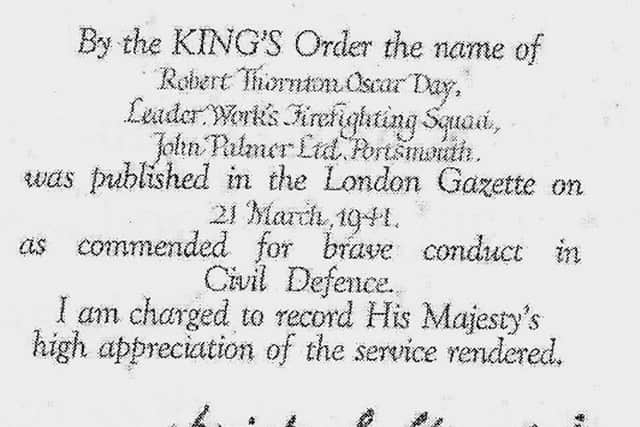Southsea’s brave brush factory firefighters killed in blitz – Nostalgia


Portsmouth’s losses during the Second World War were more than 1,000 and the majority were civilians.
Having said that, when seeing overhead film of Berlin taken after the war it is amazing that there were any Berliners left at all. There was not a building left habitable for miles surrounding the Brandenburg Gate.
Advertisement
Hide AdAdvertisement
Hide AdIndeed, when I used to visit Berlin in the late 1970s and 1980s and pass through Check Point Charlie to enter East Berlin there were places where you would have thought the war had only just ended.


Some years ago I wrote a book called Portsmouth – City of Gallant Hearts which told of the civilian population of Portsmouth who died in the conflict.
I wish I had seen the photograph, right, loaned by a Mr Russell of Copnor, of John Palmer’s brush factory which stood in Somers Road North between Fratton Road and Lucknow Street. The original entrance and reception area can still be seen.
On that night of death, January 10/11, 1941, the firestorm that caused so much damage in the city also caused the destruction of John Palmer’s brush factory and the deaths of two brave Portsmouth men and a 15-year old boy.
Advertisement
Hide AdAdvertisement
Hide AdWilliam Arthur Cripps, aged 38, of 290, Somers Road, Robert Thornton Oscar Day, aged 42 of 343, Somers Road North, and Richard William Densham, aged 15 of 288, Somers Road, all perished.
Robert Day had been Mentioned in Dispatches during the First World War for gallant conduct after extinguishing a fire near some ammunition wagons.
He was leader of the Palmer’s in-house firefighting squad. That night he was on the roof of the building with others trying to extinguish a blaze started by incendiary bombs.
Young Richard Densham was a pupil at Fawcett Road School and a part-time commissionaire at the Troxy cinema in Fratton Road. He had been sheltering in the cellar of Palmer’s and later assisted in the evacuation of the building.
Advertisement
Hide AdAdvertisement
Hide AdRobert went down from the roof to ask for assistance in fighting the fire.
William, an employee, and Richard immediately volunteered their services. They disappeared from view running up the stairs and were never seen again.
Such was the terrific heat of the fire nothing, apart from a set of keys belonging to William Cripps, was found of them.
All three received Posthumous Commendations from His Majesty King George VI for brave conduct in Civil Defence.
William left a wife and young daughter.
Advertisement
Hide AdAdvertisement
Hide AdRegarding the smart cars parked in High Street, Old Portsmouth in 1936 I asked Ian Heath if he knew how cars were delivered long before double-stacked trailer lorries.
He concludes: ‘The Lagonda factory was at Staines, Middlesex, although I think they had another facility at Hammersmith. Cars could be driven to the customer, collected from the factory, or transported on a railway goods truck. If, however, the cars were bodied by a separate firm or firms, then arrangements would have to be made with that particular concern.
‘I suspect these cars were £1,500-£2000 each. This certainly seems to imply that USG had a well-heeled clientele.
"There is always a possibility that USG were agents for Lagonda, but to have four cars delivered for four different owners, in Portsmouth? I think not. As these were vehicles for the seriously well-off, any request from the buyer would, of course, be accommodated.’
Advertisement
Hide AdAdvertisement
Hide AdAs the years pass it is inevitable that we will begin to lose the pop stars of the 1960s who were adored by the baby boomers.
We have already lost Cilla Black. Dean Ford, lead singer with Marmalade, died last December.
Roger Daltry sang ‘I hope I die before I get old’ in My Generation although most didn’t.
Scott Walker of the Walker Brothers died at the age of 76 on Monday.
Advertisement
Hide AdAdvertisement
Hide AdAround 1962 Scott, real name Noel Scott Engel, met up with John Walker and drummer Gary Leeds and the Walker Brothers were born.
Make It Easy On Yourself, penned by Bacharach and David, soon had the trio on the way to stardom and the record was quickly succeeded by My Ship Is Coming In and The Sun Ain’t Gonna Shine Anymore.
Strangely enough, Scott suffered from stage fright and and hated live gigs. The trio broke up in May 1967 but did reform in 1975 for three years which produced the single No Regrets. Perhaps one of Scott’s best recordings was when he went solo and recorded a Hatch/Trent number the superb Joanna in 1968.